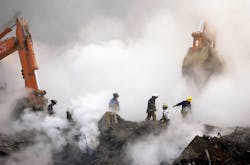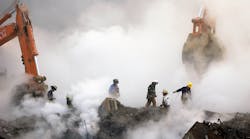Federal health authorities Monday added 58 types of cancer to the list of covered illnesses for people who were exposed to toxins at the site of the World Trade Center in the aftermath of the September 11 attacks.
The addition finalizes a recommendation from Dr. John Howard, administrator of the World Trade Center Health Program. Howard proposed in June that the program accept the recommendations of its Science/Technical Advisory Committee and add some cancers to the coverage list -- 14 categories in all.
The advisory committee review called for expanded "coverage for certain types of cancer resulting from exposure to toxins released at Ground Zero."
"The publication of this final rule marks an important step in the effort to provide needed treatment and care to 9/11 responders and survivors through the WTC Health Program," Howard said in a statement Monday.
The rule is expected to be published Wednesday in the Federal Register, and will take effect 30 days after its publication, Howard said.
First responders, volunteers, survivors of the attacks and residents near the site who meet specific qualifications will be eligible for coverage, according to the World Trade Center Health Program.
According to the proposed rule, an estimated 950 to 2,150 people would take advantage of the additional coverage.
The estimated cost for the total cancer treatment ranges between $14.5 million and $33 million, the proposal said.
The original bill as passed by the House had a 30-year compensation program, but the Senate reduced it to five years.
Many cancers may not appear for decades after an exposure, according to experts.
The World Trade Center Health Program was created as a result of the passage of the James Zadroga 9/11 Health and Compensation Act.
The Zadroga Act, passed by Congress in December 2010, is designed to provide medical services and compensation for responders who were exposed to toxins while working at ground zero.
President Barack Obama signed the $4.2 billion legislation in January 2011. The law is named after a New York police officer who died of a respiratory disease attributed to working amid the toxic chemicals at the attack site.
New York Mayor Michael Bloomberg hailed the addition Monday.
"Tomorrow we will remember those we lost to the 9/11 terrorist attacks and also those who bravely responded during and after the tragedy," he said in a statement.
"As part of our ongoing commitment to our first responders, New York City led the way in ensuring that the Zadroga Act included reviews of the medical evidence so that all those ill from exposure to the aftermath of the 9/11 attacks receive the care they need.
"We have urged from the very beginning that the decision whether or not to include cancer be based on science; Dr. Howard's decision, made after thorough consideration of the latest available research and data, will continue to ensure that those who have become ill due to the heinous attacks on 9/11 will get the medical care they need and deserve," Bloomberg said.
New York Reps. Carolyn B. Maloney, Jerrold Nadler and Peter T. King, said in a joint statement in June the proposal "helps pave the way for expanding the scope of available medical care and compensation for those sickened by the toxins at Ground Zero."
"As we have all seen with our own eyes again and again, cancer incidence among responders and survivors is a tragic fact, and we must continue to do everything we can to provide the help that those who are sick need and deserve," the lawmakers said.
The move is an about-face from Howard's announcement in July 2011, when he stated that cancer treatments would not be covered by the compensation fund.
At the time, Howard said there was inadequate "published scientific and medical findings" to link September 11 exposures to cancer.
To determine eligibility for the World Trade Center Health Program, visit www.cdc.gov/wtc.
Copyright 2008 LexisNexis, a division of Reed Elsevier Inc. All rights reserved.
Terms and Conditions | Privacy Policy







